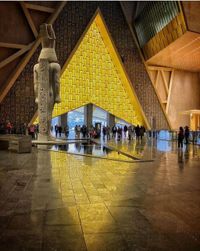Egypt is taking significant steps to enhance its tourism experience while preserving its ancient treasures, particularly the iconic Giza Pyramids and the soon-to-open Grand Egyptian Museum (GEM). With nearly 17.5 million tourists visiting in 2024 and a goal of reaching 30 million by 2030, the country is implementing a comprehensive plan aimed at sustainable tourism management.
Tourism is a critical sector for Egypt, contributing about 10% of the national GDP, equivalent to around 6.6 billion dollars. However, the influx of visitors has led to overcrowding, especially around the Giza Necropolis, which houses the Pyramids, a UNESCO World Heritage site. This situation has raised concerns about the preservation of these ancient wonders and the overall visitor experience.
To tackle these challenges, the Egyptian government has launched a multifaceted initiative that includes reorganizing access points to the pyramids, promoting eco-friendly transportation options, and eradicating unscrupulous commercial practices that have plagued the tourism sector. The aim is to ensure that the experience of visiting these historical sites is enjoyable and respectful to both tourists and local residents.
As part of this initiative, the government has proposed establishing a new access point on the Cairo-Fayum road, which will help alleviate congestion and improve the flow of visitors. Additionally, there are plans to restore surrounding tombs and enhance online ticket sales, making the process smoother for tourists.
Orascom Pyramids, a key player in this transformation, is investing millions of dollars to develop the area around the pyramids into a premier tourist destination. This investment reflects Egypt's recognition of the pyramids as the last remaining wonder of the Seven Wonders of the Ancient World.
The need for improvement has become increasingly urgent. Social media platforms have amplified tourists' complaints about harassment from street vendors and scams, which have marred the experience of visiting these historical sites. A recent viral Reddit thread highlighted these issues, with a traveler noting, "The pyramids are beautiful, but the scammers ruin the experience." Such sentiments have begun to affect Egypt's reputation as a travel destination, particularly as global tourism recovers from the pandemic.
In addition to addressing visitor experience, the treatment of animals used for tourist rides has come under scrutiny. Organizations like PETA have long criticized the conditions under which horses, donkeys, and camels are kept, often highlighting issues of malnourishment and mistreatment. In response, the Egyptian government launched an animal welfare program in the fall of 2024, focusing on improving the treatment of these animals in tourist areas, including Giza. This program includes transitioning to electric buses to reduce reliance on animal rides, offering a more sustainable and comfortable alternative.
As Egypt prepares for the grand opening of the Grand Egyptian Museum on July 3, 2025, excitement is building. This monumental project has been in the works since 2002 and will showcase over 100,000 artefacts, including the full assemblage of Tutankhamun's tomb treasures, displayed together for the first time since their discovery in 1922. The museum is designed not only to preserve Egypt's rich heritage but also to educate and inspire future generations.
The GEM will feature advanced conservation laboratories where visitors can observe the restoration processes of ancient artefacts. This behind-the-scenes look will provide a unique insight into the efforts required to safeguard Egypt's historical treasures.
Beyond its role as a museum, the GEM is envisioned as a vibrant educational and research hub, offering interactive exhibits and learning programs for visitors of all ages. Collaborations with universities and research institutions aim to enhance archaeological and historical scholarship, making ancient Egyptian history accessible and engaging.
The anticipated influx of visitors to the GEM is expected to significantly boost Egypt's economy, creating jobs in hospitality, conservation, and tourism industries. More importantly, the museum stands as a testament to Egypt's enduring cultural legacy, fostering international understanding and cultural exchange.
As the grand opening approaches, the GEM will temporarily close from June 15 to July 5, 2025, to finalize preparations and ensure a flawless debut. This brief closure will allow for critical final touches, including precise placement of artefacts and staff training, as Egypt prepares to unveil one of its most ambitious cultural projects to date.
In summary, Egypt is poised to enhance its tourism sector while safeguarding its ancient heritage. Through strategic initiatives aimed at improving visitor experiences and animal welfare, along with the opening of the Grand Egyptian Museum, the country is set to continue captivating the world with its rich history and cultural treasures.




